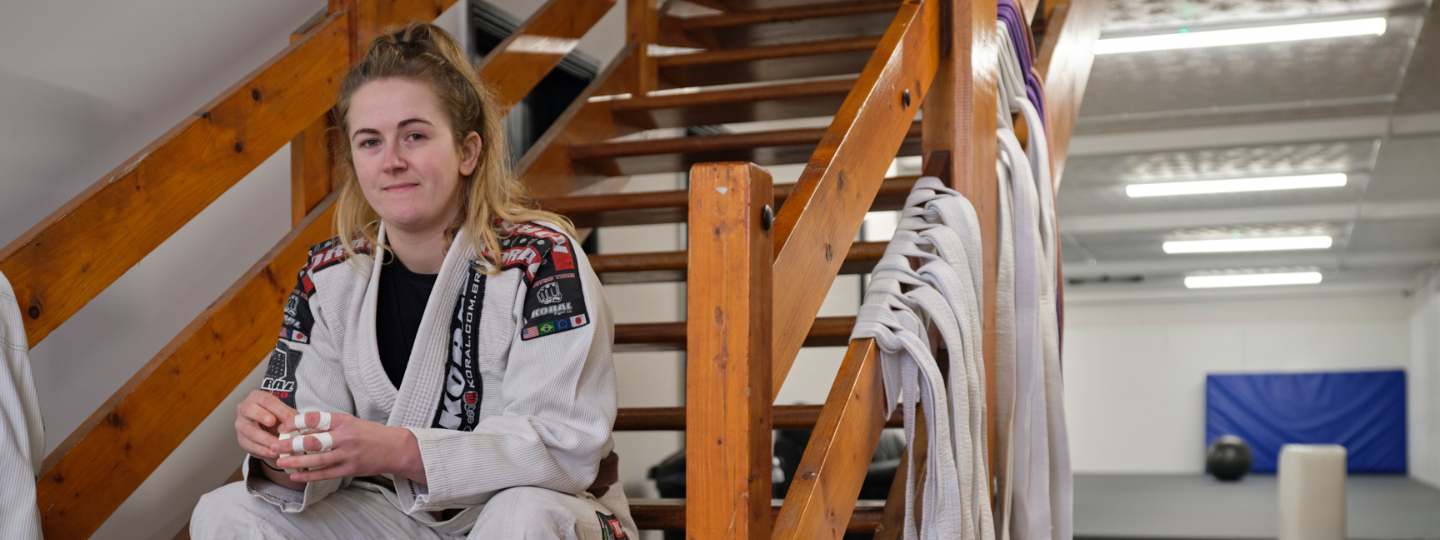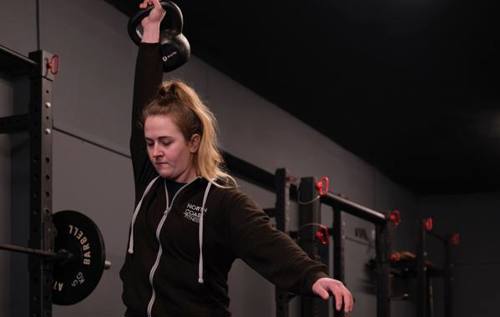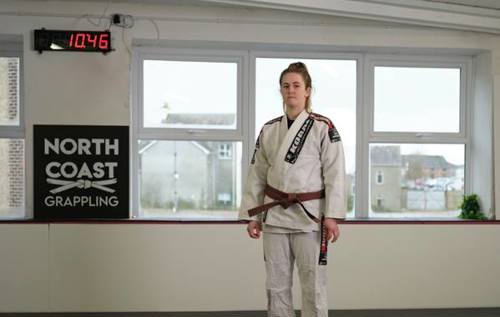How exercising with JIA makes personal trainer Becca feel empowered
24 February 2023
Physical exercise can be hugely beneficial for people with arthritis. Exercise is important when living with arthritis as it can help to ease stiffness and pain, strengthen bones and joints, and boost feelings of wellbeing. But, when you live in daily pain and your energy levels differ from day to day, finding the motivation to exercise can be tricky.
29-year-old Becca knows all about these struggles. Diagnosed with Juvenile Idiopathic Arthritis (JIA) at 11, Becca had periods of time where even walking to school was impossible.
Now a qualified personal trainer, Becca owns her own gym in Northern Ireland, which has a floor entirely for Brazilian jiu-jitsu – her favourite sport.
Becca tells us all about her incredible journey and explains how exercise has helped her to manage her condition.
Becca’s diagnosis
“I was diagnosed with JIA at the age of 11, but it took about two years to get the diagnosis. When you’re a child, I think it’s hard for people to say what they think it is in case they’re wrong. There were lots of appointments, tests and scans.
“Once I got the diagnosis I had injections until my second year of university, but they didn’t really help. It wasn’t until I started moving and exercising that my pain started to ease.”
Being advised to exercise
“When I was at university, a doctor told me it would be beneficial to try to strengthen my joints.

"He recommended finding an exercise I enjoyed so it didn’t feel like a chore. It took ten years for a doctor to suggest that to me!
“I really wanted to try kick boxing. The doctor was wary because it’s intense on the joints, but he didn’t rule it out, so I gave it a go. I really enjoyed it!
"That then kicked off my want to get stronger. I was at university at the time, so I started going to the university gym, but I had no clue what I was doing.
“When I came back from university, I went to the kick boxing club at home and asked what else was on. They had jiu-jitsu. I didn’t know what it involved but I showed up.
"I met my boyfriend doing jiu-jitsu and now we have a fitness club together.”
The benefits of jiu-jitsu
“A good thing about jiu-jitsu is that you’re always on the floor instead of standing up kicking pads. And jiu-jitsu encouraged me to start learning how to do proper resistance training with the correct form.
"This benefited me so much more than going on random machines and hoping for the best.
“I enjoy the community that comes with jiu-jitsu. Everyone remembers their first experience and it’s quite nerve wracking, but everyone’s willing to help.
“For me, exercise is about being empowered, and that has a positive effect on my mental wellbeing."
Everyone who trains with me talks about mental health and how the gym makes them feel – much more so than their physical goals.
In jiu-jitsu we have a lot of members who train for their mental health. They’ve been to counselling, and they’ve been recommended to start. They always say coming for the first time is terrifying but that it really helped.
“It’s empowering to be able to exercise now, considering how many issues I had at school even just walking. I’m very grateful for what my body is capable of when I’m having a good day. The main thing I take away is gratitude to be able to train, not for weight loss or physique goals. It’s about being able to move well and not have any pain.”
Becca’s advice for exercising with arthritis
“The main thing I would say to someone who wants to start exercising is to find an exercise that has a strong community around it.

"With jiu-jitsu, you work with a partner. They know your limitations and they help you out. After class they check in on you and find out how you’re doing. There’s a lot of support, and that makes you want to go back.
“There are so many adults who have issues with their joints and the hardest thing for them to do is start exercising. When I’m sore, exercising is the last thing I feel like doing, but I know how much it helps.
"My ankles are still cold and swollen most of the time, but keeping active has really helped.
“It frustrates me sometimes when I have clients who are so fixated on weight loss. They don’t realise maybe they’re getting stronger and physically fitter, and these are things to celebrate.
"There are lots of positives to physical fitness that aren’t based on your physique, such as having better mobility and sleep.”
What’s next for Becca?
“My boyfriend and I opened up our new fitness premises in September. We’ve had one floor in the building for jiu-jitsu for 6 years and the fitness side of things will have been open for 4 years.
“It sounds cheesy but the things you learn from exercising and a sport like jiu-jitsu kind of apply to the business as well: it’s very difficult at the start and it’s still hard at times but it’s slowly growing, which is nice to see.
“I’d like to see more and more people continue to get more out of lifting and jiu-jitsu. I’d like them to get the same things I get out of it. That’s the goal.”
We’re here to help
We have lots of resources to help, educate and motivate and people with arthritis to find an exercise routine that works for them:
- Try Let’s Move with Leon, a 12-week programme consisting of 30-minute sessions designed to help you improve mobility, posture, balance, cardiovascular and respiratory fitness and strength.
- Join our Let’s Move Facebook group, a space where people share their experience of staying active when living with arthritis.
- Sign up to our Let’s Move newsletter to receive advice and top tips on how to stay active with arthritis.
You might also be interested in...
-
Busting five common myths about exercising with arthritis
We debunk a few common myths about exercising with arthritis, so you can put your best foot forward and feel confident on your fitness journey.
-
How a fitness professional can help you stay active if you have arthritis
From physiotherapists and personal trainers to gym class instructors, there are lots of different fitness professionals who can help you achieve your goals.
-
Top tips for working with arthritis
With the right support, many people with arthritis can not only continue to work, but also grow and thrive in their careers.